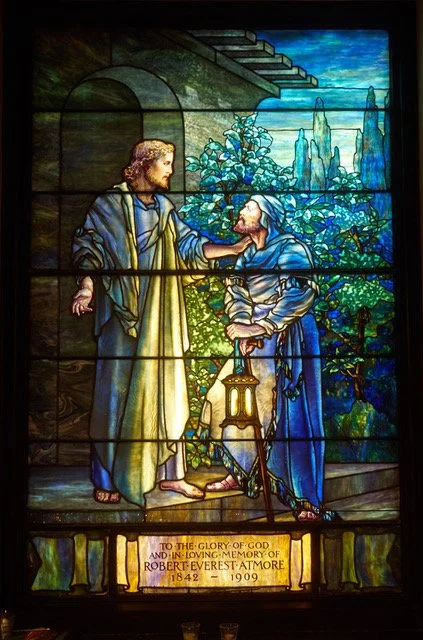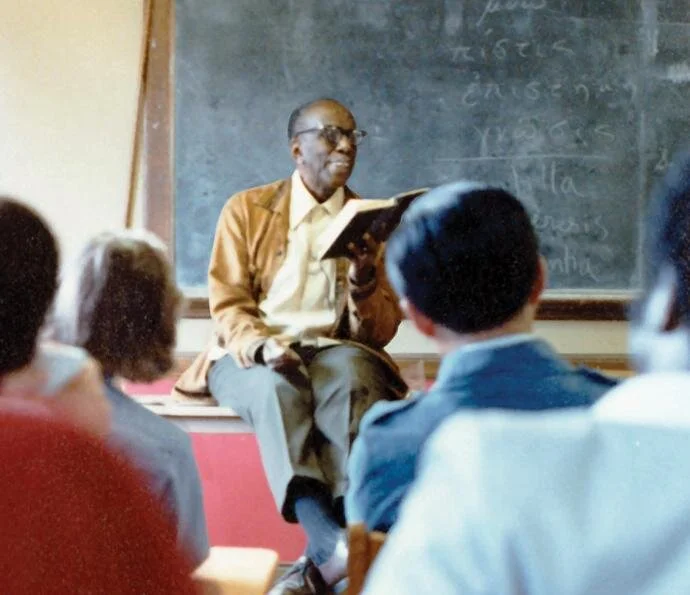Friday Reflection: On William Edward Burghardt Du Bois (1868-1963) and Alexander Crummell (1819-1898)
He did his work—he did it nobly and well; and yet I sorrow that here he worked alone, with so little human sympathy. His name to-day, in this broad land, means little and comes to [the ears of millions] laden with no incense of memory and emulation. And herein lies the tragedy of the age: not that men are poor—all men know something of poverty; not that men are wicked—who is good? not that men are ignorant-- what is Truth? Nay, but that men know so little of men.
—“Of Alexander Crummell” from WEB Du Bois, The Souls of Black Folks
View W.E.B. Du Bois’ biography here
I. William Edward Burghardt Du Bois was a very complicated man and as we seek a richer understanding of him and of his character, we have to be comfortable with a “both/and” approach. But even this “both/and” method has its limitations, for Du Bois--whom the church remembers on August 3—had an enormous presence as he lived his extraordinary life--a life in which the public part was as complicated as the private part. My goal with this Friday Reflection is to help us know more about who the man was. At the same time, I will bring Alexander Crummell into the reflection. Crummell, a widely respected African American and committed Episcopal priest, academic, African nationalist and eloquent spokesperson for the Black community in the United States, was very important to DuBois in the formative decades of his life.
II. On the one hand, Du Bois was an impressively educated African American and very comfortable with who he was as Black man and as an American. He was the first African American to receive a Ph.D from Harvard University, a founding father of American sociology, an intellectual, an academic and college professor, a practicing historian and sociologist. Du Bois was a deeply engaged human rights activist and fighter for justice and equality for Blacks, and a Pan-Africanist. He was the author of several important sociological studies, five novels, and three different autobiographies, as well as a journalist, editor, and publisher. Du Bois was one of the founders of the National Association for the Advancement of Colored People (NAACP). Overall, in so many aspects of his life, he was ever brilliant and a prodigious worker. His ideas about American society and about the realities of this divided world were at least a century ahead of others.
III. On the other hand, Du Bois was both self-serving and self-indulgent and could be duplicitous and deceitful and, often, pretentious and off-putting. He was a no-nonsense fellow and had little patience with bad work or with the people who did bad work. He was mostly a pragmatic politician, even as a socialist. Though disciplined and organized in his life, he always put himself first. From what we know, he was an inattentive husband and father; he was often arrogant and condescending and believed that, as he put it “the ultimate evil was stupidity.” Du Bois was a BIG person in his presence, actions and words and was difficult, driven, and ambitious to a fault. Ultimately, knowing the world of discrimination in which he lived, he did what he wanted and what he felt he needed to do, including becoming an expatriate, living in Ghana and becoming a citizen there at the end of his life. And what is important for our reflection here is that Du Bois had little time for organized religion and felt American churches were the “most discriminatory” of all institutions. He was not a church person, Instead, as we will see, he developed a lasting and unique inner life and a highly individualized spirituality.
IV. To gain a clearer sense of who Du Bois was and what his values were,and, important here, a deeper understanding of his inner life, I want to consider two of his early works. First, The Philadelphia Negro,a ground-breaking study which Du Bois completed in a year at the University of Pennsylvania as an “Assistant in Sociology” when he was 28 years old. And second, The Souls of Black Folk, a collection of personal essays, published in 1903. One of the essays, “Of Alexander Crummell,” introduces Crummell as Du Bois experienced him. Through this essay, we can begin to understand how important Crummell was to Du Bois’ formative world view, and to a fuller recognition of his own soul.
V. The eminent Yale University sociologist, Elijah Anderson, who provided the penetrating introduction to the 1996 edition of The Philadelphia Negro, wrote from close experience of Du Bois’ Philadelphia while himself living there and teaching at the University of Pennsylvania. Anderson has also written widely on Black life in Philadelphia and on how race “works” in the city. Indeed, my comments here rely heavily on how Anderson sees Du Bois’ study of “Negro life” in the 7th Ward of Philadelphia, a vibrant and truth-telling Black community, in an area “bounded by Spruce Street on the north, South Street on the south, Sixth Street on the east and Twenty Third street on the west.” (Anderson, p. XV). The charge given to Du Bois was to study and learn first-hand how the Black community in the 7th Ward lived, “what occupations they follow; and from what occupations they are excluded; how many of their children go to school; and to ascertain every fact which will throw light on this social problem.” (Anderson, p.XV). Du Bois did all this and more, by himself, and he completed his work, 509 pages of text and charts and tables within a year of intense study and of learning; of measuring his perceptions with reality and of recognizing that “well-intentioned” is not always what it seems. Through his one-year study, Du Bois came face to face with the power of the “color line,” and confronted head-on the reality that those in power who seemed benevolent were really not so. In fact, even his sponsors at U Penn relied on a well-worn and distorted theory that Du Bois realized had to be acknowledged and was meant to be part of his study: “that the city was going to the dogs because of the crime and venality of its Negro citizens.” For the powerful whites who had brought Du Bois to the University of Pennsylvania, his findings would “determine the nature and duration of the quarantine that the city’s notables intended to impose.” (Anderson, p. XIV-XV).
At the schools where Du Bois was formally educated and took his degrees--Fisk University, at Harvard and at the University of Berlin—he studied and learned, shaping his significant insights and original thinking. Even with his undergraduate summers at Fisk, teaching in the impoverished local black communities of Nashville, he did not directly experience discrimination and the cost of his color. But in those summers, Du Bois learned about the “rich diversity of the black race,” and he learned about life in the South and its racism and segregation, and what it really meant to be black in America. The experience of his extensive field work involved in bringing The Philadelphia Negro to life, gave Du Bois direct experience with how the dual system created by the “color line” worked, in this case an experience that shaped the rest of his life’s work. Du Bois wrote about The Philadelphia Negro in his second autobiography, Dusk of Dawn (1940):
… Of the theory back of the plan, I neither knew nor cared. I saw only here a chance to study an historical group of black folks and to show exactly what their place was in the community. [The Philadelphia Negro] was as complete a scientific study and answer as could have then been given, with defective facts and statistics, one lone worker and little money. It revealed the Negro group as a symptom, not a cause; as a striving palpitating group, and not an inert, sick body of crime; as a long historical development and not a transient occurrence. (Dusk of Dawn, pp. 58-59).
In fact, in this year-long experience, Du Bois discovered his true calling, a calling that revealed how deeply he was moved to emulate his now friend and mentor, the Episcopal priest, Alexander Crummell, whom he had met a year-and-a half before he came to Philadelphia.
VI. There is another point here, one germane to our reflection. Du Bois’ time teaching at the evangelistic Wilberforce College (1894-1896),a Black college just outside of Dayton, Ohio was, all-in-all, not a good experience for him and led him to be skeptical of organized religion and of the experience of church communities. The emotions, the narrow, exuberant, and unfocused rituals of worship at Wilberforce, the school’s tepid commitment to the intellectual life of the community, as well as the school’s autocratic leadership, made him determined that when writing about Philadelphia, he was not going to give much attention to the black churches in the 7th ward, even though these churches then, as now, had an important place in the community. It is also important for us to remember that Du Bois, with his Harvard degrees and his study at the University of Berlin should have been, at the time he was hired by Wilberforce, one of the most desirable and supremely educated potential faculty members at any school, including the most prestigious American universities. And yet, because of the “color line,” Du Bois could only find a job at Wilberforce, an institution that turned out to be, for him, a mediocre place at best. And yet we must acknowledge how much Du Bois learned there about himself and about the real world. More than anything else, the lesson of his time at Wilberforce was that while he need not accept mediocrity, the “color line” was real, and he was determined to learn how to go back and forth across it, living in two worlds. And it was at Wilberforce that Du Bois first met Alexander Crumm the person who counseled him how to live in those two worlds.
View Alexander Crummell’s biography here
VII. Du Bois had very few mentors in his life but one of them was Alexander Crummell, a Black Episcopal priest (1819-1898). Du Bois met Crummell at the 1895 Wilberforce commencement, for which Crummell gave the Commencement address. A further connection is that William Wilberforce himself was one of Crummell’s sponsors when he studied at Queens College,Cambridge University from 1849 to 1853. Du Bois was so taken with Crummell, who lived for only four years after he and Du Bois first met, that he would write a remarkable essay of admiration, respect and affection, “Of Alexander Crummell,” one of fourteen essays included in his The Souls of Black Folk. David Levering Lewis, Du Bois’ biographer, has said that apart from his own grandfather,
Crummell was the first living black man Du Bois found worthy of emulating—the first to whom he deferred with ready affection and intellectual affinity…The fatherless, self-created intellectual sensed in this campus visitor a gentle yet strong wholeness of mind and character whose development held enormous meaning for his own career.
The brilliance of “Of Alexander Crummell” is that it is both a biographical sketch of Crummell and an autobiographical sketch of Du Bois himself. What it reveals about both men is the similarity of their inner lives. How Crummell chose to live his life was transforming for Du Bois. Indeed, when Du Bois writes that Crummell, “had bent to all the gibes and prejudices, to all the hatred and discrimination, with that rare courtesy which is the armor of pure souls” (SOBF, p.258), he is writing about himself. Both men knew what Du Bois calls the “temptations of hate, despair and doubt” (SOBF, p.247) and which Lewis calls racial, personal and professional demons. Both men confronted what Du Bois calls the “Valley of Humiliation,” and the “Valley of the Shadow of Death” ( SOBF) and both men crossed those valleys. For Du Bois, the essay reveals that he had come to realize, that Crummell had shown him a way he could live his life, one element of which was living for others.
VIII. In the rich poetic language and images of The Souls of Black Folk, Du Bois tells the story of the man before whom he “instinctively bowed..as one bows before the prophets of the world.” (SOBF,p.247) And in telling this story, Du Bois noted the kinds of discrimination Crummel experienced: including that he was rejected for study at General Theological Seminary in New York City because he was black (SOBF); and that the then Bishop of the Episcopal Diocese of Pennsylvania, Henry Onderdock, told him that if he came to the Diocese to serve, “I will receive you into this Diocese on one condition: no Negro priest can sit in my church convention and no Negro church must ask for representation there.” (SOBF) In addition to his “lived life,” the writings, ideology, ministry, and sermons of Alexander Crummell were an important part of the foundation on which Du Bois built his social thought. For Du Bois, Crummell in his particular calling and in the way he lived his life, was a moral exemplar. As the renowned scholar of African-American history, Manning Marable, writes, “it is no exaggeration to suggest that [Alexander] Crummell became Du Bois’ ‘spiritual father,’ the personification of the young scholar’s image of what all Afro-American intellectuals should be.” (Marable, quoted in Lewis, p.737, note 30).
IX. To know anyone is to know that person’s soul, which is really what The Souls of Black Folk is all about, especially the essay on Alexander Crummell (who, by the way, the church celebrates on September 10). While Du Bois and Crummell had different approaches to addressing the evils of racism, inequality, and discrimination, their ends were the same. With Crummell’s death in 1898, Du Bois was left to manage his soul alone. In remembering Du Bois and Crummell, the church is urging us to explore the lives of both men, alone and together, not only to learn about their souls, but to gain insight into how their souls shaped the way these two men led their lives. And in this time of COVID-19, when life has become so dramatically altered, and when we often feel we have lost our way; a time when, finally, Black Lives do Matter and we are called to practice courage, justice and truth in the face of injustice, hypocrisy and dissembling, this may be a Kairos moment to bring William Edward Burghardt Du Bois and Alexander Crummell into the Light and into our lives. They have much to teach us.
Amen











